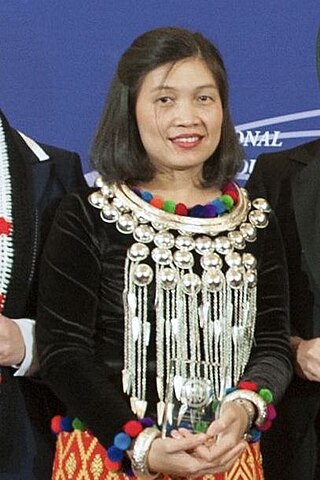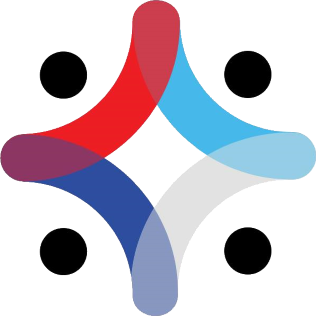
The Constitution of the Republic of Croatia is promulgated by the Croatian Parliament.
Gender mainstreaming is the public policy concept of assessing the implications for people of different genders of a planned policy action, including legislation and programmes. Mainstreaming offers a pluralistic approach that values the diversity among people of different genders.
The United Nations Entity for Gender Equality and the Empowerment of Women, also known as UN Women, is a United Nations entity charged with working for gender equality and the empowerment of women. UN Women is charged with advocating for the rights of women and girls, and focusing on a number of issues, including violence against women and violence against LGBT people.
The Ministry of Gender Equality and Family, formerly the Ministry of Gender Equality, is a cabinet-level division of the government of South Korea. It was created on February 28, 1998, as the Presidential Commission on Women's Affairs. The current ministry was formed on January 29, 2001.

FEMNET, also called the African Women's Development and Communication Network, is an organization established in 1988 to promote women's development in Africa. FEMNET helps non-government organizations share information and approaches on women's development, equality and other human rights.

Women in Croatia form half the population and in modern Croatian culture they are largely equal to men.

May Sabai Phyu is a Kachin activist from Burma. She is active in promoting human rights, freedom of expression, peace, justice for Myanmar's ethnic minorities, anti-violence in Kachin State, and lately in combating violence against women and promoting gender equality issues.
Feminism in Sweden is a significant social and political influence within Swedish society. Swedish political parties across the political spectrum commit to gender-based policies in their public political manifestos. The Swedish government assesses all policy according to the tenets of gender mainstreaming. Women in Sweden are 45% of the political representatives in the Swedish Parliament. Women make up 43% of representatives in local legislatures as of 2014. In addition, in 2014, newly sworn in Foreign Minister Margot Wallström announced a feminist foreign policy.

The Key of Croatia is a populist political party in Croatia, formed out of an anti-eviction group of the same name. The party changed its name on 21 May 2022 from its then name Human Shield the group opposes foreclosures by occupying property and forming a "human shield", hence the name. The party was founded on 2 June 2011.
Branka Gabriela Vojvodić is a Croatian journalist and former political spokesperson currently serving as the director of HINA, Croatia's nationally-owned news service.
As of 2018, the African country Rwanda ranks in the top five countries for gender equality according to the Global Gender Gap Report. The idea of fairness that dominates this country arose after the genocide against the Tutsi that occurred in 1994. The government is committed to ensuring equal rights for women and men without prejudice to the principles of gender equality and complementarity in national development. These ideas are exhibited through the roles of Rwanda women in government, the respect for women's education and the role of women in Rwanda healthcare. The country also took an active stance against rape in genocide, created a national action plan after United Nations Resolution 1325, and is pushing towards ending gender-based violence.

The Women's Antifascist Front, was a Yugoslav feminist and anti-fascist mass organisation. The predecessor to several feminist front groups in the former Yugoslavia, and present-day organisations in the region, the AFŽ was heavily involved in organising and participating in the Partisans, the communist and multi-ethnic resistance to Nazi occupation of Yugoslavia during World War II.
Women's National Council, 1923–1942, was the only women's umbrella organization in Czechoslovakia and only official women's collective which existed in the country until after 1990. As such, it was the most significant feminist organization in the interwar period. Founded by Františka Plamínková, its members strove for reform of marriage laws and employment restrictions of women, which they believed had been promised by the equality mandate in the new constitution.
Foreign aid for gender equality in Jordan includes programs funded by governments or non-governmental organizations (NGOs) that aim to empower women, close gender based gaps in opportunity and experience, and promote equal access to education, economic empowerment, and political representation in the Hashemite Kingdom of Jordan.
Women and Gender Equality Canada, known as Status of Women Canada from 1976 to 2018, is a department of the Government of Canada. Previously an agency under the Department of Canadian Heritage, it gained department status after a vote in December 2018 passed the Budget Implementation Act, 2018, No. 2, which included legislation in favour of evolving the agency into a department and increasing its power, duties, and functions to those concerning not just women, but all gender identities. The purpose of the department is to "advance equality with respect to sex, sexual orientation, and gender identity or expression through the inclusion of people of all genders, including women, in Canada's economic, social, and political life" as well as the intersection of these with other identities such as ethnicity, age, socio-economic level, disability, and others. The department partners with other areas of government, both federal and provincial, as well as civil and private organizations in order to achieve this. It is currently headed by the Minister for Women and Gender Equality, Marci Ien.
Yugoslav Women's Alliance also called National Women’s Alliance was a Yugoslavian organisation for women's rights, founded in September 1919 and abolished in 1961. It was originally named National Women's Alliance of the Kingdom of Serbs, Croats, and Slovenes, but changed name in 1929.
The Government Delegation for Gender Violence is a department of the Secretariat of State for Equality of the Spanish Department of Equality responsible for formulating the central government policy against the different forms of violence against women and promoting, coordinating and advising on all the measures carried out in this matter.
The 2020–21 Croatian Women's First Football League was the thirtieth season of Croatian Women's First Football League, the national championship for women's association football teams in Croatia, since its establishment in 1992. The season started on 27 September 2020.

The National Network is a political organization created by Vladan Glišić after leaving the Dveri movement. In 2018–2020, the organization was affiliated with the Serbian Patriotic Alliance.
The Initiative for RECOM, full name Initiative for the establishment of a Regional Commission tasked with establishing the facts about all victims of war crimes and other serious human rights violations committed on the territory of the former Socialist Federal Republic of Yugoslavia in the period from January 1, 1991, to December 31, 2001, was an initiative to establish a regional commission for truth by agreement between the states of the former Socialist Federal Republic of Yugoslavia.







